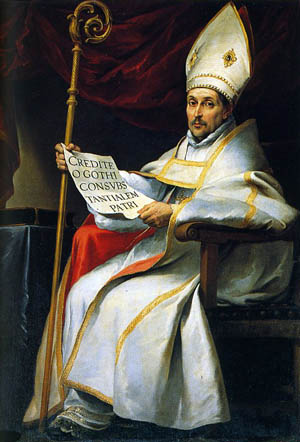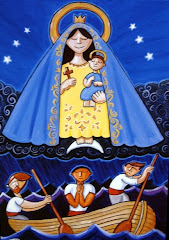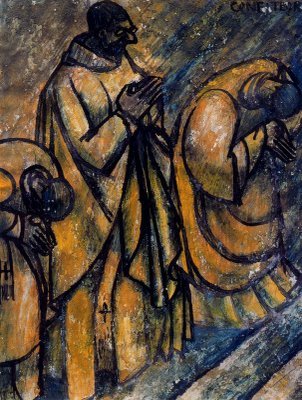
Part VI
SAINT LEANDER OF SEVILLE.
Feast: February 27
Feast: February 27
St. Leander, a close friend of St. Gregory the Great, was born in Carthagena to a family of high nobility. He was the eldest brother of several saints. His brother, St. Isidore, succeeded him as Bishop of Seville. Another brother, St. Fulgentius, became Bishop of Carthagena, and his sister, St. Florentina, became an Abbess in Carthagena.
 |
At that time, a part of the territory of Spain was dominated by the Visigoths. Those barbarians were Arians and had spread their errors in the cities they had conquered. The Iberian Peninsula had been infected by that heresy for 170 years when St. Leander was chosen Bishop of Seville. He began to combat it immediately. With the help of God, to Whom he had recourse, his efforts were successful and the heresy began to lose hold on its followers. He also played an important role in the conversion of Hermenegild, the eldest son of the Visigoth King.
King Leovigild, however, became angry over his son’s conversion and St. Leander’s activity. He exiled the Saint, and condemned his son to death. Later, he repented, recalled the Saint to Spain and asked him to educate and form his other son and successor, Reccared, who became a Catholic and helped the Saint to convert the rest of his subjects.
St. Leander played a central role at two councils, the Council of Seville and the Third Council of Toledo, where Visigothic Spain abjured Arianism in all its forms. He also wrote an influential Rule for his sister with instructions on prayer and renunciation of the world. He reformed the liturgy in Spain, adding the Nicene Creed to the Mass in order to make an express profession of the Faith against Arianism. Later, this practice passed to other Catholic countries. He died in 596.


No comments:
Post a Comment